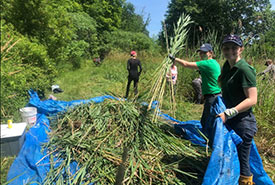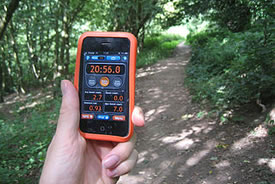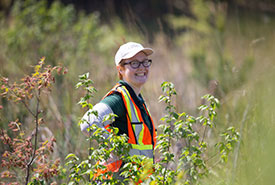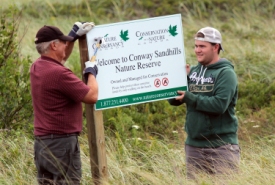NCC: Field work equals teamwork

Stewardship tasks, like removing invasive species, are a lot easier when you work together. (Photo by NCC)
Stewardship staff for the Nature Conservancy of Canada (NCC) spend many hours completing field work. When I say field work, I mean just that: work that takes place outside in nature, whether it be a field, marsh, forest or a stream. In other industries, field work can refer to work that takes place on-site at a customer’s office or business, but here I mean, literally, in the field.
I worked with some of my co-workers both in and out of the office and discovered that completing work together in the field strengthens teamwork and collaboration skills back at the office.
Field work is a critical part of implementing stewardship actions and often plays a large part of biological research. Typical field work activities include invasive species control, species at risk monitoring, planting native species and trail maintenance. Field work not only provides an opportunity to learn transferable hands-on skills, but it also increases interpersonal teamwork skills. I believe these teamwork skills take longer to develop in a traditional indoor office setting and have a more profound, lasting impact.
General teamwork skills that can be improved by completing field work include communication, shared experience and collaboration.
Communication
While in the field, you may need to split up into groups to complete a task. That’s why it’s important to establish how you are going to stay in contact with one another and complete the job efficiently.
Several types of communication devices can be used to keep in contact, including cell phones (when you have service), two-way satellite communication or my personal favourite for when you’re relatively close to each other: Marco Polo. One person yells “Marco!” and the other teammate must respond “Polo!” as a way of determining how far away each of the two teammates are from each other.

GPS device (Photo by Wikimedia Commons, Harry Wood)
Splitting up and reconvening later requires active listening, as you need to pay attention while you establish where and when you are going to meet back up, asking for clarification if needed and developing trust in each other. On a remote property, there’s all the more incentive to make sure you are both communicating effectively, especially if you aren’t the one carrying the keys to the field vehicle!
Shared experience
I find this skill to have the biggest effect on developing rapport with a co-worker and strengthening the overall partnership.

One of my co-workers, Liv Monck-Whipp, at Backus Woods, Norfolk, ON (Photo by NCC)
It can be difficult to relate to a co-worker if you’ve just recently met or don’t think you have any common interests. Field work can provide a bridge for a shared experience. Often when completing field work and things don’t go as planned, you may see something you’ve never seen before (such as a new species of bird for the list!) or, more commonly, something funny happens. Now at the lunch table, instead of trying to think of something to talk about, you can reminisce and laugh about that time your rain boots split while walking through a swamp!
Collaboration

Volunteers erect an NCC property sign, Conway Sandhills, PEI (Photo by Zack Metcalfe)
Stewardship staff often complete tasks that are either difficult to complete alone or are much slower with only one set of hands. These tasks include installing large property signs, removing invasive species, species monitoring, habitat restoration, and the list goes on. All of these are completed more efficiently and are much more enjoyable when completed in pairs or groups. These collaborative tasks usually involve teamwork skills, such as planning, organizing, making decisions and problem-solving. At the completion of the task, once you’ve become a well-oiled machine, then you get to share the sweet satisfaction of completing it together.
Completing field work as a team provides a chance for camaraderie to bloom and teamwork skills to develop, all of which are useful whether in an alvar or an office.
As warmer weather arrives, NCC stewardship staff will begin essential field work, while adhering to physical distancing rules. Although this slightly changes the way staff work with each other, I’m sure they’ll find creative ways to overcome the new challenges and be an even stronger team.




